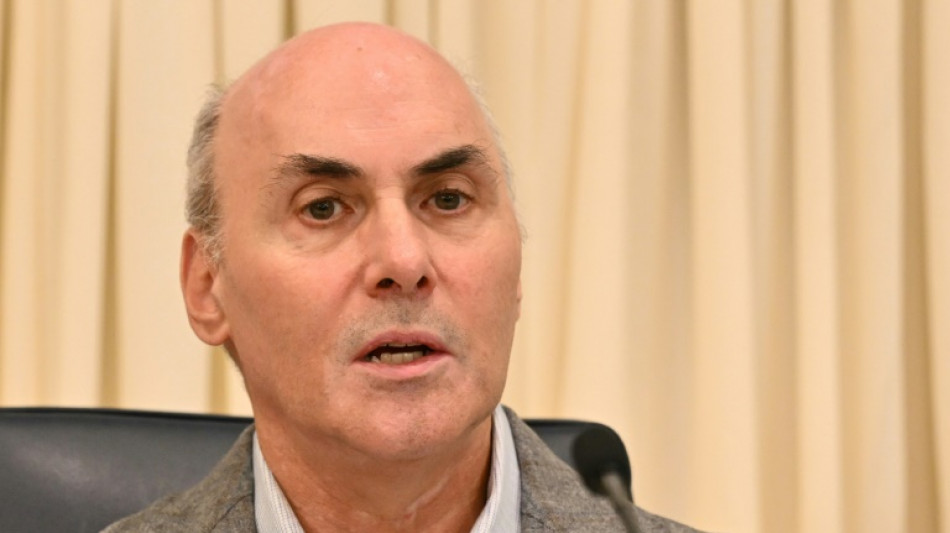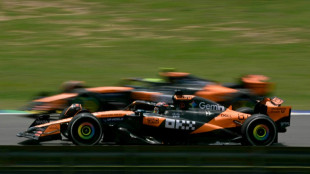
-
 Deadly storm sparks floods in Spain, disrupts Portugal vote
Deadly storm sparks floods in Spain, disrupts Portugal vote
-
Ukrainian flag bearer proud to show his country is still standing

-
 Carney scraps Canada EV sales mandate
Carney scraps Canada EV sales mandate
-
Morocco says evacuated 140,000 people due to severe weather

-
 Spurs boss Frank says Romero outburst 'dealt with internally'
Spurs boss Frank says Romero outburst 'dealt with internally'
-
Giannis suitors make deals as NBA trade deadline nears

-
 Carrick stresses significance of Munich air disaster to Man Utd history
Carrick stresses significance of Munich air disaster to Man Utd history
-
Record January window for transfers despite drop in spending

-
 'Burned inside their houses': Nigerians recount horror of massacre
'Burned inside their houses': Nigerians recount horror of massacre
-
Iran, US prepare for Oman talks after deadly protest crackdown

-
 Winter Olympics opening ceremony nears as virus disrupts ice hockey
Winter Olympics opening ceremony nears as virus disrupts ice hockey
-
Mining giant Rio Tinto abandons Glencore merger bid

-
 Davos forum opens probe into CEO Brende's Epstein links
Davos forum opens probe into CEO Brende's Epstein links
-
ECB warns of stronger euro impact, holds rates

-
 Famine spreading in Sudan's Darfur, warn UN-backed experts
Famine spreading in Sudan's Darfur, warn UN-backed experts
-
Lights back on in eastern Cuba after widespread blackout

-
 Russia, US agree to resume military contacts at Ukraine talks
Russia, US agree to resume military contacts at Ukraine talks
-
Greece aims to cut queues at ancient sites with new portal

-
 No time frame to get Palmer in 'perfect' shape - Rosenior
No time frame to get Palmer in 'perfect' shape - Rosenior
-
Stocks fall as tech valuation fears stoke volatility

-
 US Olympic body backs LA28 leadership amid Wasserman scandal
US Olympic body backs LA28 leadership amid Wasserman scandal
-
Gnabry extends Bayern Munich deal until 2028

-
 England captain Stokes suffers facial injury after being hit by ball
England captain Stokes suffers facial injury after being hit by ball
-
Italy captain Lamaro amongst trio set for 50th caps against Scotland

-
 Piastri plays down McLaren rivalry with champion Norris
Piastri plays down McLaren rivalry with champion Norris
-
ECB holds interest rates as strong euro causes jitters

-
 Spain, Portugal face floods and chaos after deadly new storm
Spain, Portugal face floods and chaos after deadly new storm
-
EU close to sealing trade deal with Australia

-
 German Cup final to stay in Berlin until 2030
German Cup final to stay in Berlin until 2030
-
What does Iran want from talks with the US?

-
 Taming the lion: Olympians take on Bormio's terrifying Stelvio piste
Taming the lion: Olympians take on Bormio's terrifying Stelvio piste
-
Wind turbine maker Vestas sees record revenue in 2025

-
 Italy's Casse tops second Olympic downhill training
Italy's Casse tops second Olympic downhill training
-
Anti-doping boss 'uncomfortable' with Valieva's coach at Olympics

-
 Bitcoin under $70,000 for first time since Trump's election
Bitcoin under $70,000 for first time since Trump's election
-
'I am sorry,' embattled UK PM tells Epstein victims

-
 England's Brook predicts record 300-plus scores at T20 World Cup
England's Brook predicts record 300-plus scores at T20 World Cup
-
Ukraine, Russia swap prisoners, US says 'work remains' to end war

-
 Wales' Rees-Zammit at full-back for Six Nations return against England
Wales' Rees-Zammit at full-back for Six Nations return against England
-
Sad horses and Draco Malfoy: China's unexpected Lunar New Year trends

-
 Hong Kong students dissolve pro-democracy group under 'severe' pressure
Hong Kong students dissolve pro-democracy group under 'severe' pressure
-
Germany claws back 59 mn euros from Amazon over price controls

-
 Germany claws back 70 mn euros from Amazon over price controls
Germany claws back 70 mn euros from Amazon over price controls
-
VW and Stellantis urge help to keep carmaking in Europe

-
 Stock markets drop amid tech concerns before rate calls
Stock markets drop amid tech concerns before rate calls
-
BBVA posts record profit after failed Sabadell takeover

-
 UN human rights agency in 'survival mode': chief
UN human rights agency in 'survival mode': chief
-
Greenpeace slams fossil fuel sponsors for Winter Olympics

-
 Greenpeace slams fossel fuel sponsors for Winter Olympics
Greenpeace slams fossel fuel sponsors for Winter Olympics
-
Kinghorn, Van der Merwe dropped by Scotland for Six Nations opener

| CMSC | -0.17% | 23.48 | $ | |
| SCS | 0.12% | 16.14 | $ | |
| NGG | -0.71% | 87.17 | $ | |
| RBGPF | 0.12% | 82.5 | $ | |
| RYCEF | -0.36% | 16.62 | $ | |
| RIO | -4.49% | 92.335 | $ | |
| CMSD | 0.21% | 23.92 | $ | |
| GSK | 3.44% | 59.27 | $ | |
| BTI | 0.61% | 62.01 | $ | |
| BCE | -4.2% | 25.279 | $ | |
| RELX | 0.73% | 30 | $ | |
| BCC | -2.52% | 88.01 | $ | |
| VOD | -6.98% | 14.685 | $ | |
| AZN | 0.78% | 188.92 | $ | |
| BP | -2.42% | 38.275 | $ | |
| JRI | 0.3% | 13.19 | $ |

Nobel-winning mRNA pioneer Weissman now wants to defeat Covid forever
From developing a one-and-done coronavirus shot to overcoming misinformation and global vaccine inequity, Nobel prize winner Drew Weissman says that at 64, he's only "speeding up."
The University of Pennsylvania immunologist was awarded the biggest accolade in medicine on Monday for his pioneering research on messenger RNA, the technology behind Covid-19 vaccines that changed the course of the pandemic.
"What happened is I got a cryptic text from Kati around four in the morning," he said in an interview with AFP, referring to his old friend, collaborator and Nobel co-winner Katalin Kariko.
She had received word from the Nobel committee that they had finally won after being passed over the past couple of years -- but they weren't sure it was real until the official announcement.
"We were wondering if somebody was pulling a prank on us!" he said.
The honors have been piling up for Weissman: the Lasker Award, the Breakthrough Prize, and many more -- though he says the Nobel was always the "ultimate," something he had dreamed of since the age of five, when he first became interested in how things work.
Having just turned 64, and helped the world tame a virus that killed an estimated seven million worldwide, he could be forgiven for considering a well-earned retirement.
But Weissman says there's too much work left to be done. "I'm speeding up and my wife and family aren't happy about it," he joked. "I'm in a good spot."
- 'Ultimate' vaccine -
First on his quest: how to improve upon Covid-19 mRNA vaccines, which have saved countless lives by protecting incredibly well against severe disease and death.
Weissman says the next step in their evolution is universal shots that will be far better than the annualized boosters currently on offer.
A "pan-coronavirus" vaccine he is working on with an international team "should cover all future variants -- and any bat coronaviruses that might cross over into people," he said.
Though coronaviruses are known to mutate fast, Weissman teamed with AI specialists to comb through their structures, which contain roughly 30,000 "nucleotides" or building blocks, in search of "conserved regions" that stay the same.
They have shown it works in animals, and now hope to begin human trials within the next six months. "We think that's going to be the ultimate vaccine," he said.
In all, his lab is developing 20 different mRNA vaccines, with seven already in human trials, protecting against everything from rare autoimmune disorders to food allergies and heart disease.
"We've really expanded our scope of research -- and that's been allowed because the world... now recognizes RNA as important," he said.
It's a far cry from Weissman's anonymity during the 1990s and 2000s when he and Kariko made their key discoveries about how mRNA could be harnessed.
Unlike traditional vaccines, messenger RNA vaccines deliver genetic instructions to turn some of the host's cells into virus-like particles, training the immune system for when it encounters the real deal.
- Misinformation and equity -
Of course, scientific advances need to reach people to make a difference, and to this end Weissman is part of a group working to tackle hesitancy at the global level.
"There's one group who refuse to take the vaccine no matter what -- they follow politicians who submit laws to try to make RNA vaccines illegal in the United States," said Weissman, referring to a Republican-backed bill in Idaho.
But those on the fence -- including conservatives, African Americans, the elderly and others -- may respond to targeted messaging that'll resonate, he added.
He's also involved in setting up production sites in low and middle-income nations, with the first, in Thailand, developing dengue and tularemia vaccines.
It's "an incredibly important thing to give access to RNA technology to every part of the world," he said. "Pfizer and Moderna aren't going to have a big interest in making a vaccine for tularemia," a rare but serious zoonotic disease that is virtually absent in developed countries.
"But if they've got production sites and researchers locally, who want to do it, then they've got everything they need."
K.Hassan--SF-PST




